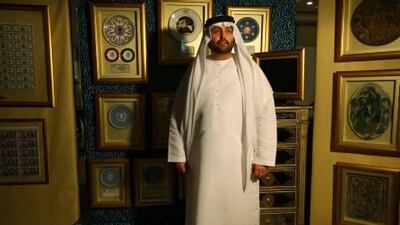Humanitarian, husband, father, collector, businessman with royal connections. However you describe Suhail Al Zarooni, what is most apparent is not just his privileged upbringing. The 39-year-old Emirati behind the invention of the robot jockey shies away from questions about his background; from merely observing the photographs on the walls of the Royal Worcester-themed meeting room, housed in one of his many residences, he has lived a privileged life. What he is candid about is his continuing charity work.
"For me, I prefer to be a humanitarian first and foremost. I think it's from when I was a small child. I liked to help people. It's like a chain. Peace comes down to children and education. Four or five years ago we started a peace initiative - Boundaries Do Not Bind - for India and Pakistan. I have good links with both countries, so I said: 'We need to start here.' Pakistanis love India, Indians love Pakistan, but unfortunately, it is politics that cause problems."
The philanthropist recently launched an environmental campaign, choosing to turf and display his vintage Rolls-Royce in the Dubai Classic Car Show as a "Think Green" initiative in December. Al Zarooni is in the midst of launching an environmental campaign, and his museum and model car collection - which has exhibited some of the world's most coveted cars - continues to use its priciest and rare collectibles to generate Green awareness, receiving acclaim from the United Nations.
Of Al Zarooni's many passions, however, child education is the most dominant. "There are different types of education. Unfortunately, they sometimes misuse the money and the education in Islamic teaching. You know what I mean, right?
"I am not into that. High education means English graduate with high school, college, university. I am planning to build a hostel in Karachi, inshallah, and then make admissions to schools and colleges. When you talk about kids' education, it's not easy. So let's see. We have to fight for that."
The Al Zarooni Foundation was officially launched on December 30. The initiative - which took 15 months to conceive - brings together regional efforts and international expertise, with a common goal to impact the level of education available to children.
A photograph of Al Zarooni's Emirati father with Sheikh Khalifa bin Zayed casually adorns the wall, both men dressed in western attire, enjoying a yacht trip. It would be easy to underestimate the peace-loving and timid figure, but at times it appears that this soft-spoken exterior is a shrewd disguise. When discussing the issue of aid and incentives often not reaching the right people, Al Zarooni cuts in, and says: "Most of the time it doesn't go to the right places. You have to monitor what is going on constantly. Not once a year or twice a year. You have to check all the time."
After studying in Lahore - his mother is of Pakistan origin - the passionate philanthropist seems to have developed a deep love for the country, visiting at least once every month. However, when asked where his devotion lies, he does not hesitate in his answer: "UAE, of course."
"I grew up here. I am proud to be Emirati and most of what I have achieved is because of the UAE. I'm not saying this because we are close to the royal family, or we have to say it. People see this with their own eyes."
Talking of his first national humanitarian success - the robot jockey - Al Zarooni is enthusiastic when explaining the logistics of how the invention works and the little time it took to develop. Cases of child trafficking and abuse have dogged the sport of camel racing for years. As a result of this and the successful development of the robot jockey, the UAE banned the use of child labour in 2002. "This is what I have always been against - child labour - and like I keep mentioning, the most important thing is education. I am sorry to say that a lot of countries misuse children. The international media and human rights put the focus on the camel race story, but there are a lot worse cases than that of the child jockey. However, there were many stories of people taking kids from their families and of them falling from camels and getting badly injured or killed. This is wrong."
It was these haunting stories and Al Zarooni's love of technology that inspired him to change the sport. "You know we are in the 21st century. We have to change. Everything is computerised. So I wanted to give people the option."
An avid collector of cars, bottles and, most recently, hotel keys, the two-time Guinness World Record holder - in 2002 and 2003, for his collection of 7,000 model cars - Al Zarooni clearly wants all his initiatives to have public longevity. What does he eventually plan to do with his collections?
"We are making a museum. I have to give my collections to the right person or to the government, so other people can enjoy them. It is important to me that people get pleasure from my work."
Follow
Arts & Life on Twitter
to keep up with all the latest news and events

